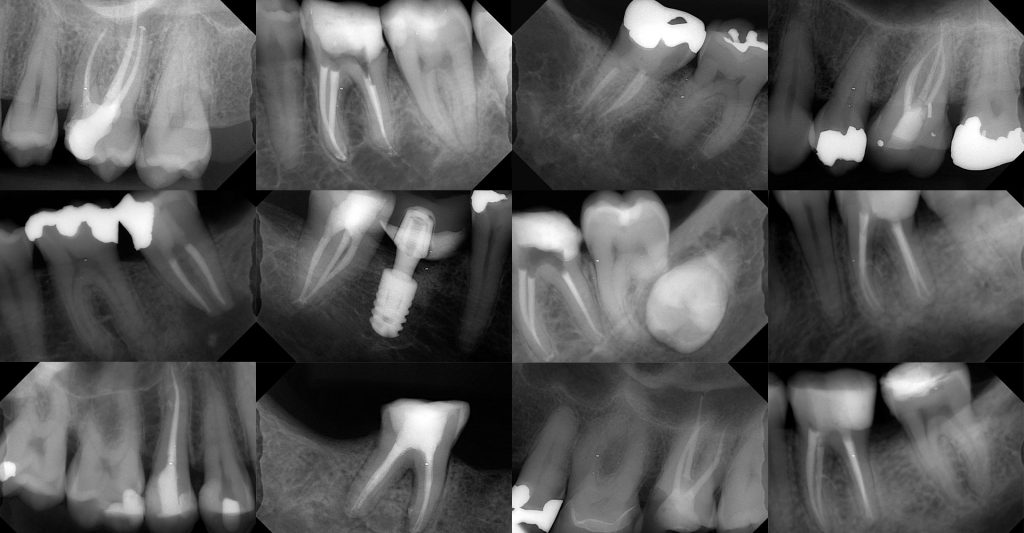Root Canal Therapy is designed to restore a nerve-damaged tooth while avoiding tooth extraction.
Root canal therapy, also known as endodontic treatment or endodontic therapy, is a minimally-invasive treatment, both less complicated and less expensive than a dental implant restoration or tooth extraction. It’s also the most effective way to preserve your damaged tooth, rather than cosmetically restoring it.
What does root canal therapy involve?
The steps for root canal therapy involve the following steps:
- Access is gained to the tooth, and any decay is removed, allowing full access for the treatment and cleaning to proceed.
- During the endodontic procedure, the infected or damaged dental pulp is removed from the root of the tooth via a small access hole—more about dental pulp below.
- Once the infectious area is removed, our dentists will clean the root canal, disinfect and shape it.
- Finally, the root canals are restored with filling material. This filling is a rubber-like material called gutta-percha and acts as a permanent bandage, preventing any future risk of infection.
X-rays will be taken before the treatment to help Dr Anand establish precisely where the underlying issue is and how he can access it.
What is the dental pulp?
The dental pulp, also known as tooth pulp, is the soft tissue inside the pulp chamber (canal) that runs through the root of your tooth to your gums. This is composed of mainly connective tissue fibres, blood vessels, lymphatic and nervous elements.
The dental pulp is there to regulate the growth and development of the tooth during infancy to youth years. Once the tooth has fully developed, tissue surrounds the root to help protect it and nourish it.
It alone plays a vital role in your teeth and without the dental pulp, any risk posed of infection, disease or damage, the tooth could not be saved.
When is root canal therapy needed?
Root canal therapy becomes necessary when the dental pulp becomes infected or inflamed. The infection can have several causes including cavities and decay, multiple dental procedures undergone on the same tooth, or an open crack or chip on the tooth exposing the nerve.
How do you know if you need root canal therapy?
There are various indicators that your tooth may be infected or diseased. However, the best way to know if you do need root canal therapy is to let the dentists at Extreme Dentistry assess you.
Some standard signs that indicate you may need root canal therapy include:
- Acute toothache when eating
- Pain when pressure is applied
- Tooth pain and sensitivity to hot or cold
- A small, spot-like bump on the gums near the area of pain
- Darkening of the tooth
Any swelling surrounding the base of the tooth can be a signal of a fermenting infection.
To be sure what is right for you, if any of the above apply to you get in touch with our team today to get more information. The sooner you get in touch, the more likely our team will be able to preserve your tooth.
Are there alternatives to root canal therapy?
Root canal therapy is a safe and reliable treatment, and therefore, there is no substitute needed.
The only alternative method for removing any shown infection is to extract the tooth. This can pose a further risk even after the infection is gone. For instance, the gap can lead to chewing and oral problems, or jaw and muscular problems, and more.
It is far better to replace the tooth naturally than artificially if the tooth can be saved. Replacing the natural tooth with another procedure can also involve more complex treatments such as dental bridges and crowns, or dental implants which is more expensive.
What specialist performs root canal therapy?
Many residents in Darwin struggle to seek dental assistance when they have a damaged or infected tooth, which can lead to more complex issues later on.
Fortunately, at Extreme Dentistry conveniently located in Darwin, we can undertake complex Endodontics procedures as the specialists would.

Root Canal Therapy Darwin
So, if you are looking for a root canal treatment in Darwin, do not hesitate to contact our experienced team at Extreme Dentistry – we’re always here to help.
If you have a damaged tooth this instance, please call us immediately to seek dental assistance and help preserve your tooth for as long as possible.
Frequently Asked Questions
You may need a root canal if you experience persistent or severe tooth pain, sensitivity to temperature, gum swelling and tenderness, tooth discolouration, or prolonged sensitivity to touch. It’s best to consult with a dentist for a proper diagnosis and recommendation for treatment.
A root canal procedure, also known as endodontic treatment, is performed to treat an infected or damaged tooth pulp. Here’s an overview of what the procedure typically entails:
- The area around the tooth is numbed with anaesthesia.
- The dentist removes the infected or damaged pulp from the tooth’s root canals.
- The canals are cleaned, shaped, and filled with a material called gutta-percha.
- A temporary filling is placed, and a dental crown may be recommended for long-term protection.
- Follow-up care and instructions are provided.
The length and complexity of the root canal procedure can vary depending on the tooth’s condition and the number of root canals involved. The dentist or endodontist will provide specific instructions for post-treatment care and pain management, if necessary. It’s essential to follow these instructions and maintain good oral hygiene to ensure proper healing and the long-term success of the root canal treatment.
During a root canal procedure, local anaesthesia is used to numb the area, ensuring that you should not feel any pain during the procedure. Some post-treatment tenderness or discomfort is normal but can usually be managed with over-the-counter pain medications. The procedure is designed to be as pain-free as possible.